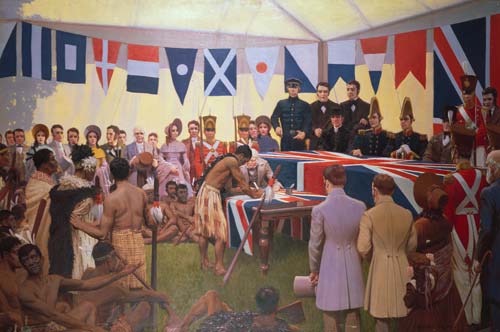On the other side of the world, today, February 6th, is Waitangi Day….and Bob Marley’s Birthday.
Since nearly all of you probably know who Bob Marley is, here is a brief lesson on what Waitangi Day is to New Zealanders; you basically need to only know a few things. In 1840, starting February 6th and going through till May 21st, Lieutenant-Governor William Hobson trekked from the North Island all the way through the South Island getting around 550 chiefs to sign the Treaty of Waitangi. The Treaty was a set of instructions Hobson received from London in 1839. Being the founding document of New Zealand’s history, politics, and culture of society. There are three articles:
Article 1: The Chiefs, and other signatories gave all their sovereign powers to the British Crown. Article 1 according to Maori: The Chiefs conferred on the Crown the right for the British to govern the colony, in a mainly administrative capacity. So you can see how the treaty has caused controversy with the different interpretations of the treaty. This can happen when trying to translate words into Maori that don’t exist. It is still to this day discussed in length.
Article 2: The Chiefs were granted, in return for their cession of sovereignty, full rights of ownership of their land and other assets. The second part of this article deals with the idea of preemption. This involved the Crown having the first option to purchase Maori land at a mutually agreeable price. Article 2 according to Maori: The Chiefs were guaranteed their rights of chieftainship (tinorangatiratanga) – effectively a sovereign right. Moreover the chiefs were promised their physical possessions and also, all those things that they held precious. The second part of this article closely resembles the English version in the guarantee of preemption.
Article 3: Maori were granted the same rights as British subjects, but were not actually made British subjects. Article 3 according to Maori: Maori were offered the protection of the Crown, and the same rights as the English people.
The Treaty of Waitangi is a HEAVILY debated topic in NZ politics, as our U.S. Constitution would be. Still, I have to say that the defining difference between how we treated the First World people of North America and how the British treated the Native people of NZ, is this treaty. I don’t really remember America caring too much about the rights of the First World people or how much land they had. Manifest Destiny all up in this. Trail of Tears much? “You can have Oklahoma. Yeah, you can have that state…or part of it at least. Okay, actually, you can have a camp on it. Oh, and most of you will die walking all the way there.” I also see a culture ingrained in this country that is dripping with history, traditions, and custom. It’s a beautiful thing when the language, food, and dance are preserved out of an importance and recognition of respect. It’s about preserving a people’s inheritance and way of life, and it is incredibly humbling to see how well they do it compared to U.S.A.
I am proud to be living in a country that, to certain extents, has lived with intention regarding the people that first lived here. I know that I am speaking in broad generalizations and am not covering all the injustices done to the Maori people. I am sorry if this offended you.
If you want to know more about Waitangi Day and the Treaty, go to these links below.
Treaty Explained—-History of the Treaty—-Treaty Explained by Maori Leader—-Short Brief of the Treaty

